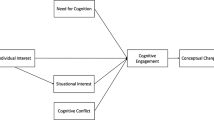Abstract
Recently, research on the role of epistemic beliefs in conceptual change has increased dramatically. The focus of that research has largely been on students’ beliefs about knowledge and knowing; that is, how one understands what it means to know. In this article, we consider the characteristics of knowledge and knowing (i.e., epistemic frames) manifest in conceptual change investigations conducted by contemporary researchers. To accomplish this purpose, we took several steps. First, we reviewed philosophical writings pertaining to epistemology and epistemological beliefs, selected prominent stances toward epistemology (i.e., epistemic frames), and delineated the defining features of each (e.g., stances regarding knowledge or justification of knowledge). Then, to illustrate how these philosophical frames might translate into psychological research, we constructed prototypic conceptual change studies for each frame. Finally, we searched the conceptual change literature for studies manifesting evidence of the various epistemic frames. We conclude with potential applications of the epistemic frames in future conceptual change research and educational practice.

Similar content being viewed by others
References
Bonjour, L., & Sosa, E. (2003). Epistemic justification: Internalism vs. externalism, foundations vs. virtues. Malden, MA: Blackwell.
Campbell, D. T. (1974). Evolutionary epistemology. In P. A. Schilpp (Ed.), The philosophy of Karl R. Popper (pp. 412–463). LaSalle, IL: Open Court.
Chinn, C. A., & Brewer, W. F. (2001). Models of data: A theory of how people evaluate data. Cognition and Instruction, 19, 323–393.
Chisholm, R. M. (1989). Theory of knowledge (3rd ed.). Englewood Cliffs, NJ: Prentice Hall.
DeRose, K. (2004). Sosa, safety, sensitivity, and skeptical hypotheses. In J. Greco (Ed.), Ernest Sosa and his critics (pp. 22–41). Malden, MA: Blackwell.
Derrida, J. (2002). Culture et dépendences—Spécial Jacques Derrida, presented by F.-O. Giesbert, with the participation of E. Levy, C. Pépin, D. Schnick, & S. Werba (France 3 Television, May 2002). Trans. D. Egéa-Kuehne.
Gettier, E. (1963). Is justified true belief knowledge? Analysis, 23, 121–123.
Goldman, A. (2001). Social epistemology. In E. N. Zalta (Ed.), Stanford encyclopedia of philosophy. Retrieved on April 2, 2004, from http://plato.stanford.edu/archives/win2003/goldman.
Hofer, B. K. (2004). Exploring the dimensions of personal epistemology in differing classroom contexts: Student interpretations during the first year of college. Contemporary Educational Psychology, 29, 129–163.
Hofer, B. K., & Pintrich, P. R. (1997). The development of epistemological theories: Beliefs about knowledge and knowing and their relation to learning. Review of Educational Research, 67, 88–140.
Kitchener, R. (2002). Folk epistemology: An introduction. New Ideas in Psychology, 20, 89–105.
Klein, P. (2001). Skepticism. In E. N. Zalta (Ed.), Stanford encyclopedia of philosophy. Retrieved on April 2, 2004, from http://plato.stanford.edu/archives/win2003/klein.
Kvanvig, J. (1992). The intellectual virtues and the life of the mind. Savage, MD: Rowman and Littlefield.
Mason, L. (1996). An analysis of children’s construction of new knowledge through their use of reasoning and arguing in classroom discussions. International Journal of Qualitative Studies in Education, 9, 411–433.
Mason, L., & Boscolo, P. (2004). Role of epistemological understanding and interest in interpreting a controversy and in topic-specific belief change. Contemporary Educational Psychology, 29, 103–128.
Montmarquet, J. (1993). Epistemic virtue and doxastic responsibility. Lanham: Rowman and Littlefield.
Moser, P. K. (1995). Epistemology. In R. Audi (Ed.), Cambridge dictionary of philosophy (pp. 233–238). New York: Cambridge University Press.
Moser, P. K., & vander Nat, A. (2003). Human knowledge: Classical and contemporary approaches (3rd ed.). New York: Oxford University Press.
Murphy, P. K., & Mason, L. (in press). Changing knowledge and changing beliefs. In P. A. Alexander & P. Winne (Eds.), Handbook of educational psychology (2nd ed.). New York: Lawrence Ehrlbaum.
Nussbaum, E. M., & Sinatra, G. M. (2003). Argument and conceptual engagement. Contemporary Educational Psychology, 28, 384–395.
Piaget, J. (1968). Quantification, conservation, and nativism. Science, 162, 976–979.
Piaget, J., & Garcia, R. (1989). Psychogenesis and the history of science. New York: Columbia University Press.
Pollock, J. L., & Cruz, J. (1999). Contemporary theories of knowledge (2nd ed.). New York: Rowman & Littlefield.
Quinton, A. (2001). The rise, fall, and rise of epistemology. In A. O’Hear (Ed.), Philosophy at the new millennium (pp. 61–72). New York: Cambridge University Press.
Rokeach, M. (1968). The organization and modification of beliefs. In Beliefs, attitudes, and values: A theory of organization and change (pp. 1–21). San Francisco: Jossey-Bass Publishers.
Ryle, G. (1958). Knowing how and knowing that. In I. Scheffler (Ed.), Philosophy and education. Boston: Allyn and Bacon.
Schommer-Aikins, M. (2002). An evolving theoretical framework for an epistemological belief system. In B. K. Hofer & P. R. Pintrich (Eds.), Personal epistemology: The psychology of beliefs about knowledge and knowing (pp. 103–118). Mahwah, NJ: Erlbaum.
She, H. C. (2004). Fostering radical conceptual change through dual-situated learning model. Journal of Research in Science Teaching, 41, 142–164.
Siegler, R. S. (1996). Emerging minds: The process of change in children’s thinking. New York: Oxford University Press.
Sinatra, G. M., & Pintrich, P. R. (Eds.). (2003). Intentional conceptual change. Mahwah, NJ: Lawrence Erlbaum Associates.
Sosa, E. (1980). The raft and the pyramid: Coherence versus foundations in the theory of knowledge. Midwest Studies in Philosophy, 5, 3–25.
Sosa, E. (1994). Knowledge and justification (Vol. 1). Brookfield, VT: Dartmouth Publishing Company, Ltd.
Southerland, S. A., Sinatra, G. M., & Matthews, M. R. (2001). Belief, knowledge, and science education. Educational Psychology Review, 13(4), 325–351.
Vosniadou, S., & Brewer, W. F. (1994). Mental models of the day/night cycle. Cognitive Science, 18, 123–183.
Wilkinson, I. A., Murphy, P. K., & Soter, A. (2003). Group discussions as a mechanism for promoting high-level comprehension of text. Technical report 1. (PR/Award No. R305G020075). Columbus, OH: The Ohio State University.
Williams, M. (2001). Problems of knowledge: A critical introduction to epistemology. New York: Oxford University Press.
Wuketits, F. M. (1990). Evolutionary epistemology and its implications for humankind. Albany: State University of New York Press.
Author information
Authors and Affiliations
Corresponding author
Rights and permissions
About this article
Cite this article
Murphy, P.K., Alexander, P.A., Greene, J.A. et al. Examining epistemic frames in conceptual change research: implications for learning and instruction. Asia Pacific Educ. Rev. 13, 475–486 (2012). https://doi.org/10.1007/s12564-011-9199-0
Received:
Revised:
Accepted:
Published:
Issue Date:
DOI: https://doi.org/10.1007/s12564-011-9199-0




